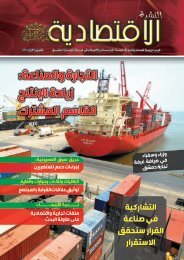SIGAR
2017-01-30qr
2017-01-30qr
You also want an ePaper? Increase the reach of your titles
YUMPU automatically turns print PDFs into web optimized ePapers that Google loves.
GOVERNANCE<br />
U.S. RECONSTRUCTION FUNDING FOR GOVERNANCE<br />
As of December 31, 2016, the United States had provided nearly $32.8 billion<br />
to support governance and economic development in Afghanistan. Most<br />
of this funding, more than $19.4 billion, was appropriated to the Economic<br />
Support Fund (ESF) administered by the State Department (State) and the<br />
U.S. Agency for International Development (USAID).<br />
MUTUAL ACCOUNTABILITY UPDATES<br />
At the Senior Officials Meeting (SOM) in September 2015, the international<br />
community and the Afghan government agreed to the Self-Reliance through<br />
Mutual Accountability Framework (SMAF) to guide their activities at least<br />
to the end of the present government’s term. 397<br />
The SMAF covers six areas: (1) improving security and political stability<br />
(with three associated indicators); (2) anticorruption, governance, rule of<br />
law, and human rights (14 indicators); (3) restoring fiscal sustainability and<br />
integrity of public finance and commercial banking (nine indicators); (4)<br />
reforming development planning and management, and ensuring citizens’<br />
development rights (three indicators); (5) private-sector development and<br />
inclusive growth and development (four indicators); and (6) development<br />
partnerships and aid effectiveness (eight indicators). 398 At the October 2016<br />
Brussels Conference, international donors and the Afghan government also<br />
agreed to 24 new “SMART” (Specific, Measurable, Achievable, Realistic, and<br />
Time-bound) deliverables for 2017 and 2018. 399<br />
According to USAID, there were no notable updates for SMAF deliverable<br />
progress this quarter. 400<br />
Electoral Reform Challenges<br />
Overhauling the electoral process was a central part of the power-sharing<br />
deal brokered by the United States between President Ghani and his former<br />
election rival, now Chief Executive Abdullah, after the troubled 2014 presidential<br />
elections. The September 2014 agreement that led to forming the<br />
national-unity government called for immediate establishment of a special<br />
commission for election reform. The intent was to implement reform before<br />
the 2015 parliamentary elections and to distribute electronic identity cards<br />
to all Afghan citizens as quickly as possible. 401<br />
At the October Brussels Conference, the Afghan government agreed to<br />
take concrete steps toward electoral reform and preparations in 2017. 402<br />
In November, the chief justice of the Afghan Supreme Court swore<br />
in a new slate of election commissioners including seven Independent<br />
Election Commission (IEC) commissioners—down from the previous<br />
nine commissioners—and five Independent Election Complaints<br />
Commission (IECC) commissioners. According to State, replacing the<br />
discredited incumbent commissioners is seen as the first step toward<br />
REPORT TO THE UNITED STATES CONGRESS I JANUARY 30, 2017<br />
121







